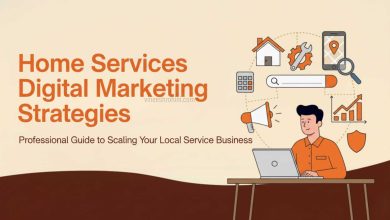Relationship Marketing : Building Long-Term Customer Connections for Business Growth in 2025
Relationship Marketing : In the modern competitive marketplace, businesses can no longer rely solely on one-time transactions to survive. The key to sustainable growth lies in developing deep, meaningful, and long-term relationships with customers. This strategy is known as Relationship Marketing—a customer-focused approach that prioritizes loyalty, trust, and engagement over quick sales. In 2025, with technological advancements, evolving consumer expectations, and an abundance of choices available in every industry, relationship marketing has emerged as one of the most powerful tools for business success. Companies that master relationship marketing are able to create customer advocates, reduce churn rates, and increase lifetime customer value.
Table of Contents
This detailed guide will explore the meaning of relationship marketing, its core principles, strategies, benefits, challenges, and how businesses can implement it effectively to stay ahead in today’s ever-changing environment.
Understanding Relationship Marketing

Relationship Marketing refers to strategies and practices aimed at fostering long-term engagement between a business and its customers. Instead of focusing on pushing products or services for immediate profit, relationship marketing emphasizes building trust, providing value, and nurturing loyalty. The idea is that satisfied, loyal customers will return repeatedly, spend more over time, and recommend the brand to others, creating a ripple effect of growth. The origins of relationship marketing can be traced back to the 1980s when marketers began shifting from a transaction-based approach to one centered on retention and loyalty. Over the decades, technology has amplified the power of this strategy through CRM systems, social media engagement, personalization tools, and data analytics.
Also Read : Tools to Automate Digital Marketing : Comprehensive Guide 2025
In today’s digital-first world, relationship marketing goes beyond traditional advertising. It’s about personalized communication, exceptional customer experiences, and consistent engagement across multiple channels. Whether you’re running a small local business, an e-commerce store, or a multinational corporation, relationship marketing principles remain the same: know your customers, understand their needs, exceed their expectations, and keep them coming back.
Core Principles
Successful relationship marketing is built on several key principles:
- Customer-Centric Mindset – The customer’s needs, preferences, and satisfaction should be at the center of every decision the business makes.
- Trust and Transparency – Building genuine trust through honest communication, clear policies, and ethical practices is essential.
- Personalization – Offering customized experiences, recommendations, and solutions makes customers feel valued.
- Consistent Communication – Regular, relevant, and value-driven communication strengthens bonds over time.
- Loyalty Rewards – Appreciating and rewarding loyal customers ensures they feel recognized and motivated to stay.
- Long-Term Focus – Prioritizing customer retention over short-term sales boosts sustainable growth.
By adhering to these principles, businesses can create a strong foundation for customer relationships that withstand market fluctuations and competitive pressures.
Why Relationship Marketing Matters in 2025
The business landscape in 2025 is vastly different from just a decade ago. Digital transformation, artificial intelligence, data analytics, and e-commerce growth have given customers more options than ever before. They are no longer impressed by generic advertising or one-size-fits-all offers. Instead, they expect personalized, relevant, and consistent interactions.
Furthermore, acquiring a new customer costs significantly more than retaining an existing one. Studies indicate that increasing customer retention rates by just 5% can boost profits by up to 95%. With consumers facing choice overload, their loyalty goes to brands that remember their preferences, communicate effectively, and deliver exceptional experiences.
Relationship marketing meets these demands by focusing on connection over conversion, ensuring customers feel valued at every touchpoint. This emotional connection not only drives repeat purchases but also turns customers into brand advocates who voluntarily promote the business through word-of-mouth and social media.
Effective Strategies for Relationship Marketing

To implement relationship marketing successfully, businesses must combine creativity, technology, and customer insights. Below are some of the most effective strategies for building lasting customer relationships in 2025:
1. Personalized Customer Experiences
Customers are more likely to engage with brands that understand their individual needs. Businesses can use CRM tools and AI-driven analytics to segment audiences, track behaviors, and offer tailored recommendations. For example, e-commerce platforms can display products based on browsing history, while service providers can send personalized offers on birthdays or anniversaries.
2. Content Marketing for Engagement
Providing valuable, relevant, and consistent content positions your brand as an authority in your niche. Blogs, videos, webinars, and newsletters help keep customers informed and connected. Educational content not only builds trust but also deepens the relationship by offering solutions before a customer even asks.
3. Loyalty and Rewards Programs
Offering rewards for repeat purchases encourages long-term engagement. Points-based systems, exclusive discounts, early access to new products, and VIP events make customers feel appreciated. The more personalized the rewards, the better the impact.
4. Active Social Media Interaction
Social media platforms like Insta, FB , and , LinkedIn are not just for promotions—they’re powerful tools for two-way communication. Responding to comments, sharing user-generated content, and conducting polls or Q&A sessions make customers feel heard and involved.
5. Email and SMS Marketing
Direct communication channels such as email and SMS allow businesses to send timely updates, offers, and personalized messages. These channels are highly effective for nurturing customer relationships when used to deliver value, not spam.
6. Exceptional Customer Service
Customer service is often the deciding factor in retention. Brands that offer prompt, empathetic, and effective support earn customer loyalty. Live chat, chatbots, and 24/7 helplines ensure customers can reach you whenever they need help.
7. Community Building
Creating an online or offline community where customers can interact with each other and the brand fosters a sense of belonging. Forums, FB groups, and brand ambassador programs give customers a platform to share experiences, provide feedback, and stay connected.
8. Feedback and Continuous Improvement
Encouraging customer feedback shows you value their opinions. Businesses should not only collect feedback but also act on it to improve products, services, and processes.
Benefits of Relationship Marketing
When implemented effectively, relationship marketing offers a range of benefits:
- Higher Customer Retention – Loyal customers are less likely to switch to competitors.
- Increased Customer Lifetime Value – Satisfied customers spend more over time.
- Positive Word-of-Mouth – Happy customers naturally recommend your brand.
- Lower Marketing Costs – Retaining customers is more cost-effective than acquiring new ones.
- Stronger Brand Reputation – Consistent engagement builds credibility and trust.
Challenges in Relationship Marketing
While the rewards are significant, relationship marketing also comes with challenges:
- Data Privacy Concerns – Customers are increasingly aware of how their data is used.
- Consistency Across Channels – Maintaining a unified brand voice on all platforms can be difficult.
- Balancing Automation with Personalization – Over-automation can feel impersonal, while manual engagement can be time-consuming.
- Adapting to Changing Expectations – Consumer preferences evolve rapidly, requiring constant adaptation.
Buy Now : Content Marketing Pro Blueprint
Businesses must address these challenges proactively to ensure the effectiveness of their relationship marketing strategies.
Future Trends
Looking ahead, several trends will shape the future of relationship marketing:
- AI-Powered Personalization – Artificial intelligence will enable even more accurate customer targeting.
- Omnichannel Experiences – Seamless integration across online and offline touchpoints will become standard.
- Sustainability and Ethics – Brands that demonstrate social responsibility will earn deeper trust.
- Interactive Content – Gamification, quizzes, and AR experiences will boost engagement.
- Predictive Analytics – Businesses will anticipate customer needs before they arise.
Implementing Relationship Marketing in Your Business
To start building a relationship marketing strategy, follow these steps:
- Know Your Audience – Conduct thorough market research to understand demographics, preferences, and pain points.
- Choose the Right Tools – Invest in CRM, marketing automation, and analytics software.
- Create a Communication Plan – Determine how, when, and where you will engage with customers.
- Deliver Consistent Value – Focus on solving customer problems, not just selling products.
- Measure and Adjust – Track KPIs like retention rate, customer satisfaction score (CSAT), and net promoter score (NPS) to refine your approach.
Conclusion

In an era where customers have endless choices and limited attention spans, relationship marketing offers a sustainable path to growth. It shifts the focus from transactions to trust, from one-time buyers to lifelong supporters. By delivering personalized experiences, communicating consistently, and prioritizing customer satisfaction, businesses can build connections that last for years. In 2025 and beyond, brands that excel in relationship marketing will not only retain customers but turn them into passionate advocates, ensuring long-term profitability and success.
Disclaimer: This content is for informational purposes only and should not be considered professional advice.



